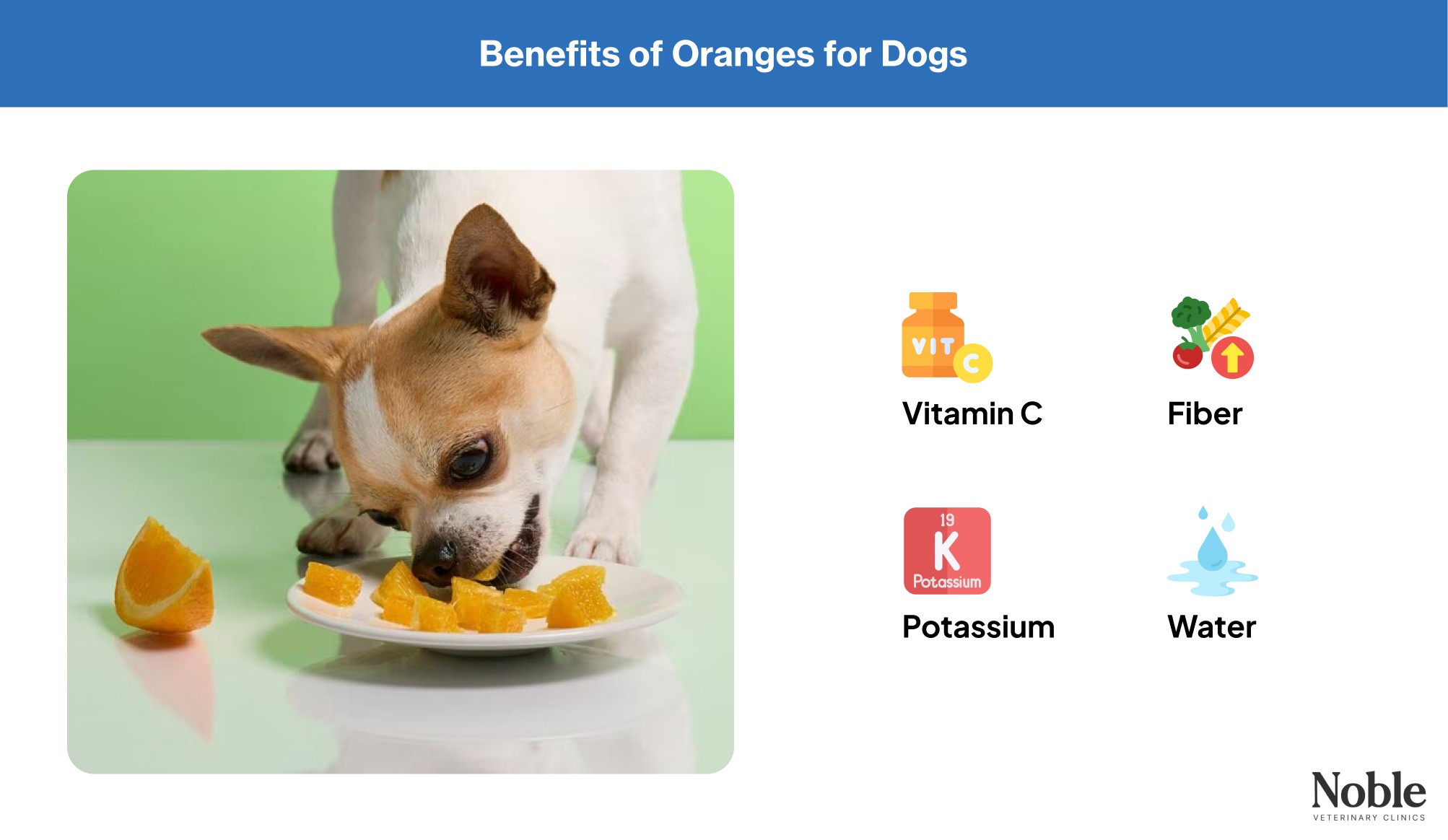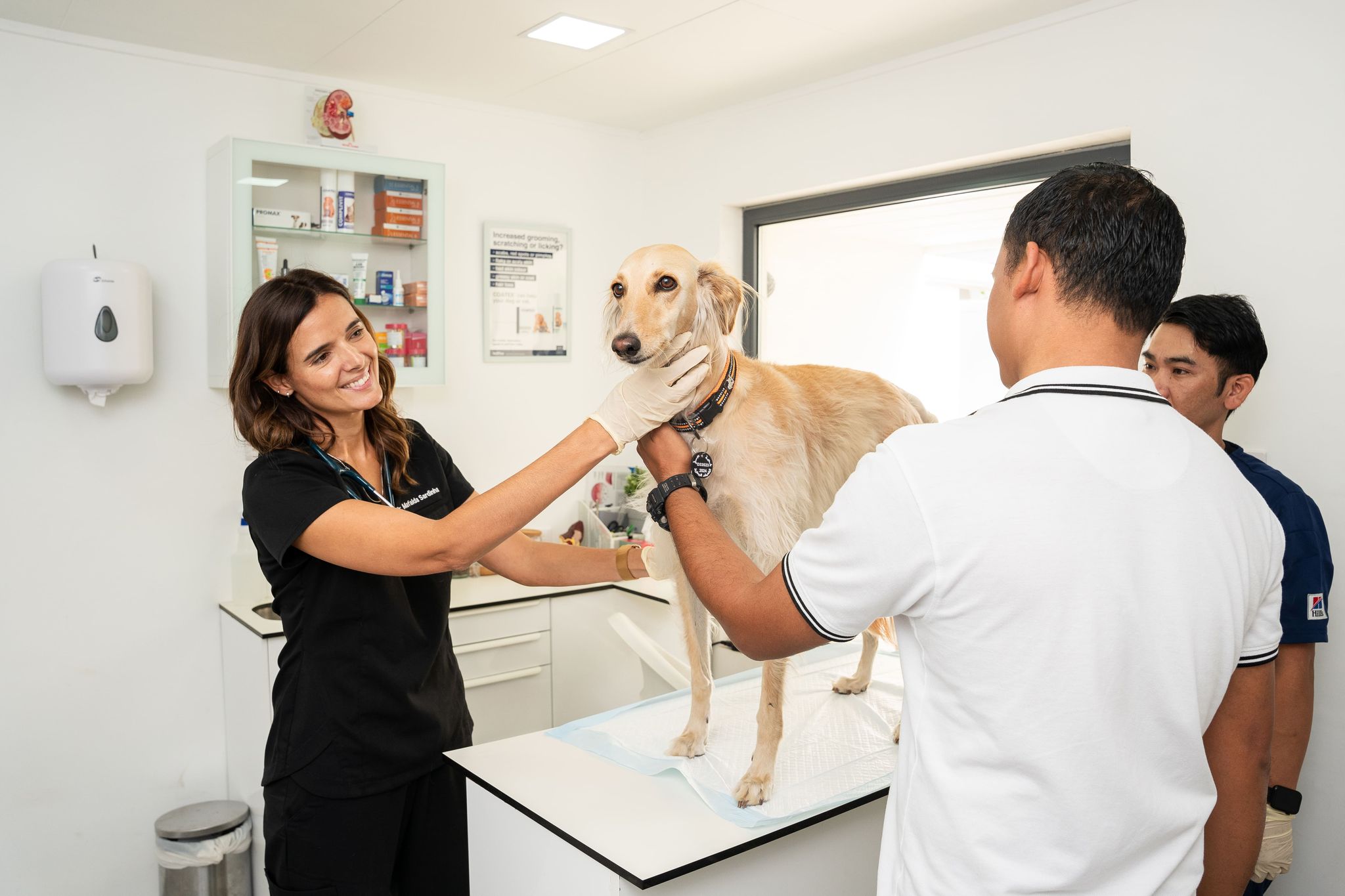


Sometimes, it’s fun to give our dogs a share of what we eat. It’s a way of including them in what we’re doing while also giving them a taste of something delicious. With anything you give, it’s always important to see if this is safe and beneficial for your pup.
So, can dogs eat oranges? In short, yes, they can. But with any type of food, moderation is always recommended. These fruits are packed with essential nutrients that support their overall health and happiness. Plus, they’re perfect for hot, sunny days.
Before you give them a piece, read on about dogs and oranges to see if they’re beneficial for our best friends.
Is Orange Good for Dogs?

Oranges are good for dogs, and they’re safe as well. These are the benefits of oranges for dogs:
Vitamin C
Oranges are a great source of vitamin C. It's an essential antioxidant that helps strengthen your dog’s immune system. It helps keep free radicals from entering and destroying your dog’s body, and it reduces oxidative stress. This is especially beneficial for dogs experiencing health issues.
Plus, vitamin C is a useful component that helps promote healthier skin and heal wounds. While dogs naturally produce their own vitamin C, supplements are also very beneficial, especially when they’re sick.
Fiber
The fiber in oranges is also important for a dog's digestion. It is crucial for bowel movements and preventing constipation. And, it's also a prime part of keeping a healthy gut microbiome.
Fiber is especially beneficial for dogs that require digestive or weight management support. It helps dogs feel fuller longer, reducing their urge to overeat. These foods are a great addition to your dog’s main meal, as they can complement its protein intake.
Potassium
Potassium is also another nutrient dogs get when they eat oranges. This helps with nerve and muscle function, while also supporting the heart and kidneys. It's an essential part of your dog’s diet. It also helps regulate fluids in the body, which is important for hydration and overall health.
Water
Dogs need to stay hydrated, especially during playtime. Oranges are composed of approximately 86% water, making them a refreshing snack for your dog. These fruits are best served cold during hot weather or after exercise.
Water helps clean your dog’s urinary tract, prevents heat stroke, and aids in digestion. However, oranges should not replace fresh water. They just provide a good boost in hydration.
When Are Oranges Bad for Dogs?

While dogs and oranges are a good combination, there will be times when the fruit does more harm than good. These include:
High Sugar
Oranges are naturally high in sugar, which can be a problem for dogs if eaten in large amounts. Too much sugar intake is bad for dogs, as it can easily increase their weight. Plus, it also increases the chances of diabetes and dental problems.
Digestive Upset
High fiber and sugar can be too much for your dog's stomach. This can lead to vomiting, diarrhea, gas, and abdominal discomfort. It's especially common for dogs who have sensitive digestive systems.
Additionally, the citric acid in oranges can irritate your dog's stomach. Acidic foods can also irritate the mouth and throat, making them uncomfortable.
Choking Hazard
Dogs can only eat the fruit and not the seeds or peels. Even though the seeds are small, they're hard and can get lodged in the throat. Peels are also tough and fibrous, making it hard to chew and digest.
The seeds and peels can also cause intestinal blockages in dogs. Since they provide zero nutritional value, it's best to avoid giving them.
Toxic Compounds
Aside from being choking hazards, the seeds and peels of oranges can also contain toxic compounds for dogs. These include trace amounts of cyanide, essential oils, and psoralens. While a small amount is not deadly, it’s best to avoid them entirely to prevent stomach irritation.
Can All Dogs Eat Oranges?
Dogs can enjoy oranges without a hitch. However, dogs with diabetes should avoid them altogether. The high sugar content of oranges can potentially lead to blood sugar spikes. Dogs with sensitive stomachs should also avoid this fruit, as it can be too much for them.
Can Dogs Drink Orange Juice?
No, dogs should not drink orange juice because of its high sugar content. While orange slices are healthy, orange juice is not. It's a highly concentrated drink of sugar and acidity, one that can irritate their stomachs and cause them to gain weight easily.
Many orange juices meant for humans have additional sugars, flavorings, and additives that aren't safe for dogs. These can be bad for their digestive systems and overall health.
How to Safely Feed Oranges to Dogs

If you know your dog can eat oranges, then be sure to prepare them the right way.
Pick the Oranges
Make sure that the oranges you pick are fresh, ripe, and free from mold spots. Plus, avoid canned and packed oranges as they’re not meant for dogs because of the added ingredients.
Wash and Peel
First things first, wash the oranges. Since fruits can have pesticides and dirt on them, washing them is crucial. Next, remove the peels and seeds.
Introduce Small Portions
If your dog is new to oranges, start with a small piece and check for any reactions for a few minutes. If there aren’t any, then feel free to give according to your dog’s size.
Your dog’s size and health condition will help you determine how much orange is appropriate for them. Small dogs and puppies should only be given very small portions, while larger dogs may be able to handle a bit more.
Here’s a guide:
Dog Size | Pieces of Oranges |
|---|---|
Small (Less than 10 kg) | 1 piece |
Medium (11 to 25 kg) | 2 pieces |
Large (26 to 45 kg) | 2 to 3 pieces |
Giant (More than 45 kg) | 3 pieces |
Fun Ways to Give Oranges to Dogs
You can make the experience of giving your dog oranges more enjoyable by making it a fun treat. Take the pieces of small oranges and create something fun with them. Here are a few ideas you can do:
Fruit Smoothie. Oranges can be mixed with other healthy fruits, such as strawberries, bananas, and other fruits, to make cold and refreshing smoothies for your dog. However, be sure not to add any sugar, as the sugar content of these fruits is already high.
Frozen Oranges. Open up an orange and remove the seeds. Next up, separate the orange slices and freeze them in the freezer. Once they are ready, give only one or two pieces and save the rest for the next treat.
Food Pair. Oranges can also be given together with your dog’s main meal. This adds a new texture and flavor, which most dogs love.
Yogurt Toppings. Blend the oranges with plain, sugar-free, and xylitol-free yogurt. This combination makes the treat more interesting and gives your dog a mental boost.
“With their every meal, let’s keep our dogs excited.”
- Dr. Paulina Czerska
Final Thoughts
Oranges are a great way to give your dog a sweet and refreshing treat. Because they have good amounts of Vitamin C, fiber, potassium, calcium, and water, these juicy fruits can boost your dog’s immune system, support digestion, and help keep them hydrated.
Share











